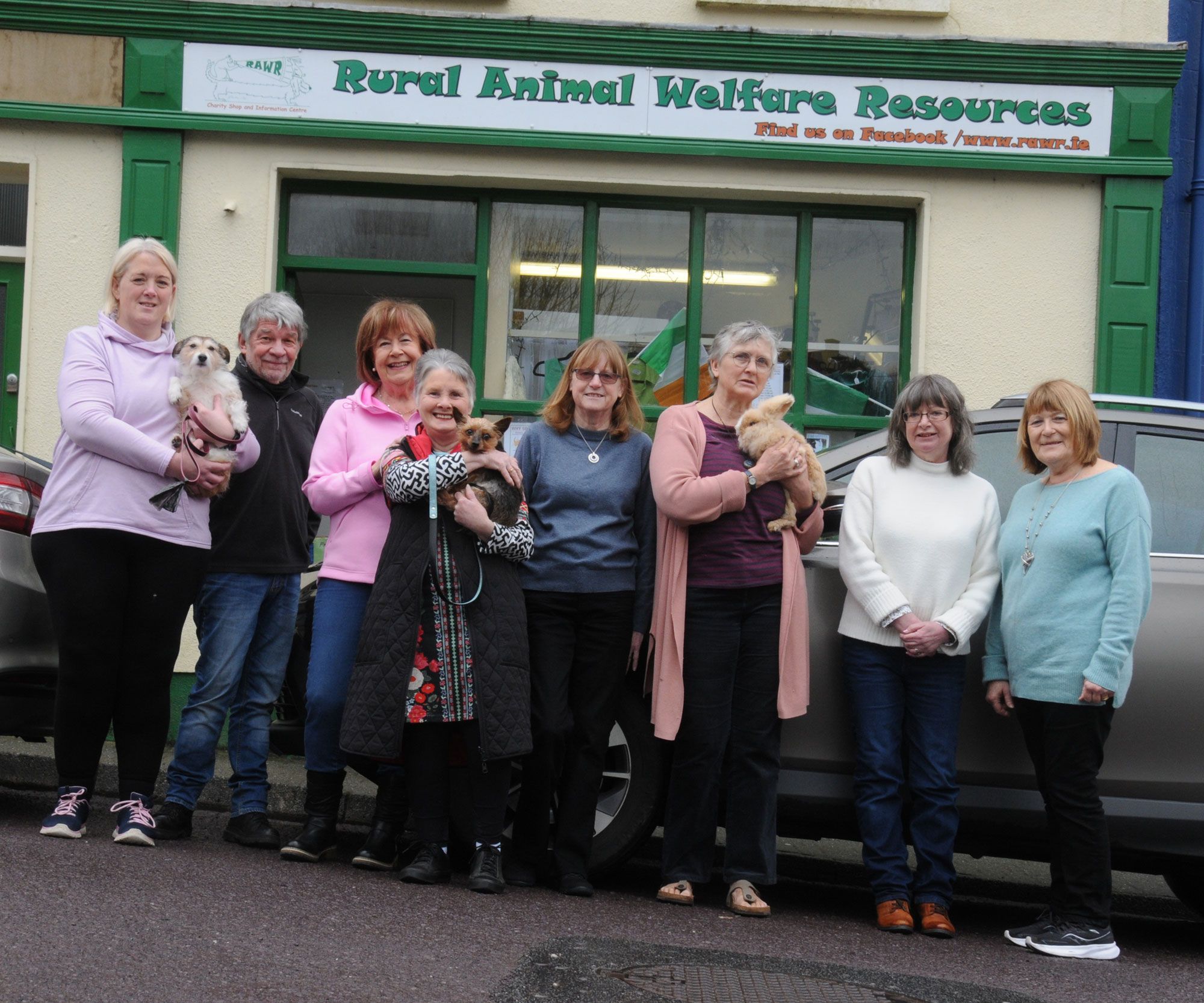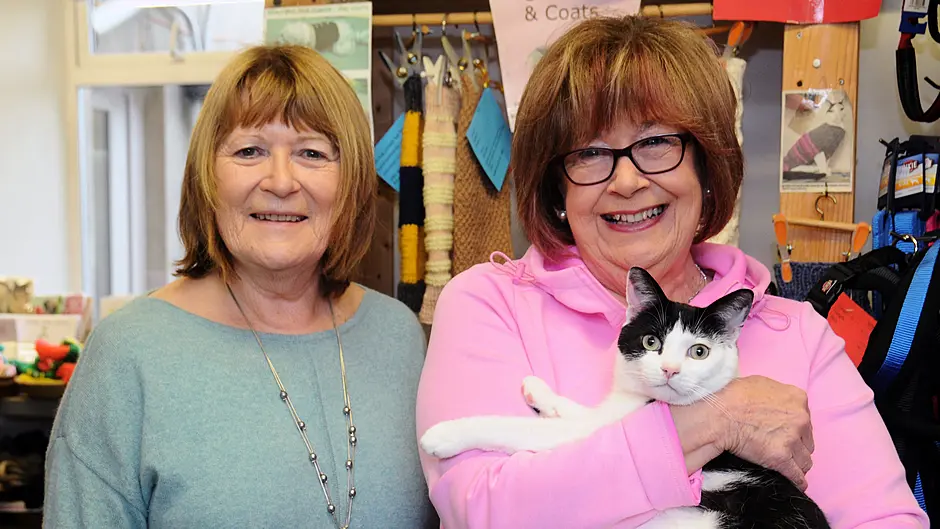For more than a decade the volunteers at a Bantry animal charity have worked for animal welfare in West Cork, with a special focus on cats, writes CAMMY HARLEY
‘AROUND 300,0000 kittens are born in Ireland every year and by the time they are four months old over 180,0000 of them are dead.’
That’s the stark reality which spurred on Jennifer Carroll, a registered veterinary nurse at Fachtna Collins MVB, and founder and current chairperson of Rawr (Rural Animal Welfare Resources).
Rawr is a local registered charity based in Bantry finding solutions to ease animal suffering throughout West Cork. The group is run entirely by volunteers who are all deeply invested in animal welfare and who encourage the neutering of companion animals and increased human responsibility for the animals in their care.
‘I got into volunteering 20 years ago with one of the local animal welfare rescue groups,’ said Jennifer Carroll. ‘Rescue is great and helps the animal in question, but it doesn’t solve the bigger problem. Rescue takes up a lot of space and time which means there is not much left over to devote to other aspects.
‘In regards to cats, there are no available stats in Ireland and the UK, so ours are based of stats used in America which works out the population of feral cats in the country by multiplying the number of households by .5 to give an idea of how many feral cats there are in any given area. When we looked at the figures, we realised that while rescue is great, it is not going to put a dent in the problem.’
‘Of the 300,000 kittens born in Ireland each year, more than half of them die by four months old. A lot of them perish from the elements, predation, accidents and starvation but most die from in-breeding issues and flu viruses that the mother cat passes down so that kittens are born with them making them genetic and not congenital, so a lot of that suffering can be alleviated through neutering.
‘The reason you have a cat population somewhere is because you have got a resource - either shelter, food or something along those lines, so if you simply remove the population, you are just opening the space up for different cats to move into it. Nature loves a vacuum, so in that regard, rescue alone does not work. After doing a lot of research, we decided that a Trap-Release-Neuter (TNR) programme as used in America by groups such as Alley Cat Allies, Operation Catnip and FixNation, would be the best thing to implement.’
The TRN programme traps the cats and they get taken to the vet where they are health checked, de-wormed, de-flead, neutered and then ear tipped.
Ear tipping marks them as officially identifiable as having been neutered so if that cat leaves an area, it will be obvious to any observer that it has already been done and will prevent the cat from having an unnecessary second surgery. Ear tipping does not bother the cat and it has become the universally accepted sign. Even if they are outdoors, at a glance trappers can see that one ear is shorter than the other.Rawr was one of the first organisations in Ireland to adopt the TRN programme. Jennifer recalls going to an animal welfare conference held by the Department of Agriculture where the DSPCA and ISPCA were all giving talks and discussing the TRN policy and what it entailed and Jennifer sitting there thinking ‘we have been doing this for years in West Cork already.’
Rawr is about 12 years old now, but the work was going on for years before it became official. It was originally called Paw but there was an organisation of the same name already established in Tipperary, so the group settled on Rawr.
 Shop volunteers outside the RAWR charity shop in Bantry: Ria O’Connell, Chris Cooke, Sandy da Silva, Catherine
Shop volunteers outside the RAWR charity shop in Bantry: Ria O’Connell, Chris Cooke, Sandy da Silva, CatherineMurphy, Mo O’Toole, Susy Greaves, Louise Cooke, and Julie Coldrick.
Jennifer’s hands-on experience over the past 20 years has made her an expert at reading behaviour and body language of animals: ‘I have been dealing with feral cats for 20 years between the vets’ office and trapping and I have yet to be sent to hospital by a cat. The idea with TRN is that you never touch the animal while it’s awake or you’ll get savaged.
‘We get people who like to volunteer to do the TRN which is great but you have to have your own transport and be willing for it to regularly stink of cat urine.
‘Once when I had been trapping on Bere Island, I came over on the ferry with 25 cats in my van and was stopped by the guards. When you are sitting in the van with them (cats) for 10 minutes you don’t smell it anymore, but when I wound down the window, the guard literally reeled from the smell of it and told me to hurry on!’
Those cats were all treated and returned to the island. With TRN, the cat population then becomes stable and the group that’s there holds the space and generally won’t let anyone else in. Over time, the population will age and fade away. On an island such as Bere Island, it is a microcosm of how it could work for Ireland.
 RAWR volunteers Louise and Ria with her rescue pet dog ‘Basil’.
RAWR volunteers Louise and Ria with her rescue pet dog ‘Basil’.
‘You do get people who don’t respect the effort and those who don’t agree with it, they say it’s natural to have kittens. But it’s not natural to have cats in Ireland, they are in introduced species and do impact on the environment too.’ Jennifer explains that cats also get a lot of blame for wildlife destruction but in reality 80% of the decline comes from habitat destruction and the other 20% includes everything else such as disease, poison, and cats. Cats generally hunt at dusk and dawn so responsible cat ownership would mean keeping them indoors at those times so as to lessen their impact on the immediate wildlife.
Jennifer is often the first person tagged on local noticeboards when there is an animal emergency. ‘We deal with wildlife under Rawr as well as no-one else is really doing wildlife and I am not a species-ist. I have done some wildlife rehab courses and have also done Seal Rescue Ireland’s courses and so get calls from them too on occasion to help out. But ideally, in an emergency situation, people should contact a vet.’
Every cent taken in at the Rawr shop in Bantry goes directly to the charity. Everyone involved in the organisation are volunteers and no-one is paid. ‘The vast majority of the money that we get in goes to vet fees which is our biggest expense. Twice a year we run the Tackle it for a Tenner programme. Numbers are limited depending on how much spare money we have and the idea is to encourage people to bring their own cats in to be neutered at a subsidised rate.’
‘We always welcome volunteers for the shop as the rent stays the same regardless of whether the shop is open or not. If anyone is interested in doing their own fundraising walk or event to help Rawr, their efforts will also be greatly appreciated.’
 Volunteers Susy, with her rescue pet rabbit ‘Shandy’, Mo and Kathleen with her rescue pet dog ‘Ben’.
Volunteers Susy, with her rescue pet rabbit ‘Shandy’, Mo and Kathleen with her rescue pet dog ‘Ben’.
Transition Year students from Coláiste Pobail Bheanntraí helped out this year by manning the street collection which was greatly appreciated and Rawr says it would be great if they could help on an annual basis. Donations of items to the shop are also welcomed. Good quality clothing can be sold in the shop and older clothes, which can be marked as textiles, can be donated as they are sold to recycling companies by weight. Rawr has also signed up to Thrifify.ie, an app that is more like an online vintage shop which allows charity shops to sell quality items at a fairer price than what they can sell it for on the shop floor. ‘We want to get the best value for good items as every €35 we make is a cat neutered’.
Rawr also works closely with the West Cork Animal Welfare Group in Rosscarbery, who are mainly a dog rescue. The two organisations help each other out where possible. Rawr also does dog neutering vouchers also which allow €40 off the procedure plus a free microchip.
Participating veterinary practises for the Rawr dog and cat neutering discount vouchers are: Bantry, Fachtna Collins, 027-53639; Skibbereen, Castlelands-Hourihanes, 028-22211; Dunmanway, Brookpark, 023-8845777 and Castletownbere, Brian Murphy, 027-70366.
For more information and to volunteer or donate, contact Rawr on Facebook or visit www.rawr.ie










